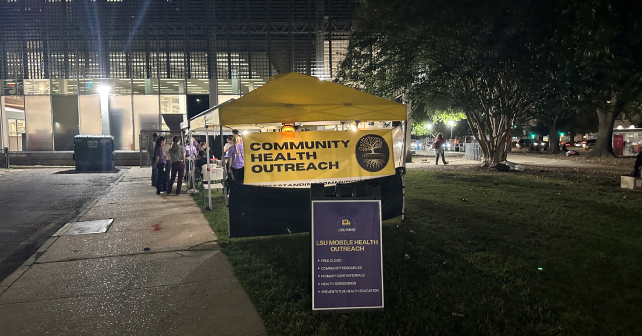
“A lot of it is chronic ailments—high blood pressure, diabetes,” she said. “‘I lost my meds, or they were stolen, or I couldn’t fill my medications.’”
Explore This Issue
ACEP Now: Vol 43 – No 12 – December 2024Making a Street Run
At the University of South Florida, Enola Okonkwo, MD, participates in a student-driven Tampa Bay Street Medicine program, delivering care to Tampa’s homeless population. Through the program, Dr. Okonkwo and a team of medical students, residents, and faculty embark on “street runs” along a central downtown route frequented by the unhoused community. The team goes out in small groups, carrying backpacks loaded with basic medical supplies and dressed in matching, recognizable green shirts. They don’t provide prescription medications, but they have a “mini pharmacy” of over-the-counter medicine, wound care items, insect repellent, hygiene kits, and Narcan.
“Sometimes, patients just need someone to help them understand when a problem might require an ER visit,” Dr. Okonkwo said. “One patient came to us with a severe hand infection. We got him to Tampa General for IV antibiotics before it became life-threatening.”
For Dr. Okonkwo, whose regular job is serving as associate program director for University of South Florida’s emergency residency program, one of the most impactful aspects of street medicine is the opportunity to connect with patients on their own terms; the population has a totally different demeanor on the street.
“They know we’re there only to help them,” she said. “It’s a different level of trust, without the metrics or pressure typical in the ER. The informal, nonclinical setting helps ease the stigma and guardedness these individuals often feel in traditional health care environments, and it lets us focus on simple medicine and essential care.”
Beyond street medicine, the Tampa program also provides a student-led continuity clinic and a specialized refugee clinic, both of which are commonly staffed by emergency physicians. The continuity clinic operates out of Tampa Hope, a structured shelter with semi-permanent mini-cottages funded by Catholic Charities, and offers a stable location for ongoing care. Volunteers can prescribe medications and provide a primary care bridge to reduce ED visits. For Dr. Okonkwo, it’s this more consistent care model that makes a lasting difference.
“We’re helping to fill the primary care gap, which is essential for avoiding preventable complications in vulnerable populations,” she said.
The student-led refugee clinic, Dr. Okonkwo’s “passion project,” delivers free health care to refugees resettling in Florida. She describes this as “a unique practice where I can incorporate global health training to address specific needs, ranging from preventive medicine to conditions such as parasitic infections and complex nutritional issues, often seen among newcomers who have spent extended time in transition.” Recently, the clinic acquired an ultrasound machine, thanks to grant funding, which allows them to provide real-time diagnostics and reduce the need to refer patients for costly imaging. EM ultrasound faculty regularly volunteer in the clinic, which has been incredibly valuable for patients and medical students to learn alongside the faculty.




No Responses to “Emergency Physicians Volunteer to Deliver Care”